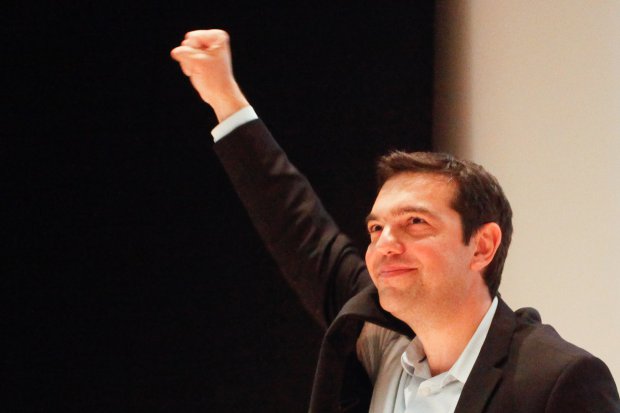Interview with the European Left
- Published on Wednesday, 14 May 2014 17:31

Alexis Tsipras may become the next Prime Minister of Greece. Indeed, if elections were held today he would win, according to surveys. He almost became the PM two years ago, in the last elections; he was one point short of a win. The popular support of his campaign scared conservatives, not only in Grece but throughout Europe. Many political and other forces banded against him, claiming that if SYRIZA won, the party would take Greece out of the Euro and EZ, and that chaos would ensue. This was a blatant lie meant to scare citizens. SYRIZA is, and has been, committed to keeping Greece in Europe. SYRIZA wants to help reform Europe, and to increase democracy.
They tried to slander Syriza, but Syriza continued its work by challenging the Troika and its conservative and social-democratic alllies. They tried to vilify Tsipras, however his image has become associated with hope that Europe will once again be based on freedoms, rights and social services, education and public health, decent wages. His charisma exceeded the boundaries of the Hellenic peninsula.
Alexis Tsipras, 39 years old, today represents the European Left, the only Party which stands up to the Troika and wants to return Europe to its founding values of democracy, and to put the economy in the service of people instead of banks. The first item on the candidate's agenda is to put an end to austerity and the memoranda. He also wants to organize a European Debt Conference that will cancel illegitimate debt, reorganize European institutions and put an end to the economy forces that impoverish workers.
Tsipras is asking for the vote of the European Left in this crucial moment to be able to change politics and not succumb to the forces that support austerity.
European Left: Last December, the Party of the European Left, at its Congress and after a deep debate, decided to present a candidate for the Presidency of the European Commission. 84% of the delegates gave you the responsibility to do it with the goal to raise a strong voice in Europe for an alternative to end austerity. How do you evaluate the work that has been done during these last 5 months?
Alexis Tsipras: During the past five months I was able to meet and talk with the ordinary woman and man on the street in various bigger and smaller cities across Europe. Because I have not centered my pre-electoral campaign on TV studios. I have not run a TV campaign at all. Nor am I lecturing people behind closed doors. I feel certain that the message of hope and change of the European left has come across. I also feel certain that people now know that there is a credible alternative to neoliberal Europe of Ms Merkel. They now know that the European Left is presenting realistic alternative policies to meet the needs of 21st century Europe. They all have clear conscience of the fact that this May we are voting for our lives.
EL.: We are in a critical crossroad to decide what will be the future for people in Europe, in which conditions we will survive after the crisis and how will be the social, economic and environmental European policy for the next 5 years. In this context, what message do you have for the 400 millions Europeans entitled to vote on May 25th?
A. T.: They should all participate in the May election. They should not let the others vote for them. Particularly, all the people who want to end austerity now, they should go and vote against austerity. They should go and vote for the European Left. We should all stand up and be counted! Because these elections are unique. They are a referendum on our lives. It is for the first time that their results are so critical for Europe, for our countries, for each and every one of us. Our vote affects the course, not only of each of our countries separately, but of the entire Continent. This time we can. It is now urgent. To roll back neoliberalism and the German Europe. We can and it is urgent. To make Ms. Merkel a political minority in Europe. To isolate her politically. To defeat her. To put an end to austerity to regain democracy. To regain Europe.
Europe is now at a historical juncture. Either it will go on with austerity, unemployment, and poverty for many years. With less democracy. Or it will change course, fostering growth, justice and decent work. With more democracy. That’s why the dilemma we face on election day throughout Europe is clear: Either with the Left or with austerity. Either with the Left or with Merkel. In the elections of this May, either those who are responsible for the crisis will be defeated and the institutional context of austerity will be permanently overturned. Or, they will be able to go on, as if nothing has happened in Europe in the last four years; they will go on, with lies and evasions, killing both the peoples and the future of Europe. For those who reject austerity and want a better future; who want hope for themselves and for their families; who want jobs and prosperity; the European Left is that future.
EL.: If the main objective of European Left is to refound Europe, where to start from and which are the keys of the change?
A. T.: To be able to change Europe we first need to change the balance of political forces in Europe. That is up to the peoples of Europe to do, with their vote in a few days. Europe should turn Left, with a strong vote to the European Left. We should make 2014 a year of change. Then, there will be two keys to change: one, the immediate end of austerity and all Memoranda, and two, the gradual democratic reorganization of European institutions, ensuring citizen participation in decisions that concern them, so as to tackle the so-called “democratic deficit”.
EL.: You say austerity does not work, but it worked very well for the so called “casino economy” which, as you declared before, took advantage of the crises to become richer by taking profit of the reduction of labour cost and the privatization and sale of the public resources. How are you going to fight against the powerful financial markets which rule the world without wining any election?
A. T.: The power of financial markets is derived and is political. This is in the sense that their power has been accorded to them by the European political establishment. In the context of laissez-faire neoliberalism, it withdrew all forms of direct and indirect controls from their operation and allowed the banking system to fuel them with financial-product liquidity. The conservatives, the liberals and the social-democrats, they all conceded to make democracy responsive to the markets and not vice versa. It is a neoliberal policy choice. Casino capitalism can be contained on the European level. To achieve that, however, we should first reverse the balance of political forces in Europe in favor of the European Left. That would enable us to put forward our political proposals. For example, a “European Glass-Steagall Act”, which is central to our program, would by itself contain casino capitalism in Europe, as it would separate commercial and investment banking activities, prevent such a dangerous merging of risks into one uncontrolled entity, and curtail commercial banks’ engagement in securities and other financial-product activities.
EL.: What is your project to create employment for the 27 million Europeans who are looking for jobs, especially for the young people, with rates of unemployment that reach 60% in Greece and Spain?
A. T.: An indispensable immediate first step would be to end austerity and introduce an internal-demand-oriented policy, centered on increasing the incomes and, thereby, the consumption-capacity of the lower and middle classes. A parallel step would be the so-called “European New Deal”. That is, a European plan of, initially, public investment in the areas of education, research and innovation, new technologies and infrastructure with strong and earmarked European funding. We will give priority to the coordinated reflation of European economies so that Europe stops whirling around the trap of recession, stagnation and anemic growth, with high employment.
EL.: You and the European Left call for a European Convention on debt and public investment in order to solve the problem of the debts of countries in difficulty, as it´s been done with Germany in 1953, as a first step torwards the economic recovery. What are the proposals of the EL to sort out the problem of the debt?
A. T.: Our political plan to manage Eurozone overindebtedness effectively, credibly, and definitely relies on three pillars: first, ending austerity. Because austerity is the feeder of the debt to GDP ratio. Thus, we need policy change to bring about balanced and viable growth. But growth will not appear as soon as austerity ends. Therefore, the second pillar is the “European New Deal” that I mentioned above. And, in parallel, the third pillar is the “European Debt Conference” to deal with the volume of outstanding debt per se. That could involve a variety of possible country-specific solutions, including writing-off a significant part of the face value, with a “growth clause” for the repayment of the remaining part, partial debt monetization by the European Central Bank, moratorium on debt repayments, etc.
EL.: You also insisted in the need to build the broadest possible social and political alliances. How is this process working?
A. T.: Changing Europe is a task of historic proportions that requires the engagement of the widest possible social and political forces. It will not happen overnight. It is a process which involves both immediate changes (economic policy) and step-by-step reforms to dismantle the neoliberal structure of Eurozone economic governance that Ms Merkel and her political allies have been building during the years of the crisis. For example, the necessary annulation of the so-called European fiscal compact, which has been ratified either by referendum or through a standard parliamentary procedure, cannot be a one-day affair. It is no coincidence that Greece, which, since May 2010, has been a guinea pig for the neoliberal policy prescriptions of the European Union and, accordingly, a source of a negative domino in the European South, could now become, with a SYRIZA government, the source of a reverse, positive domino across Europe; the source of ending austerity and initiating democratic change. That’s why the vote for the European Left is a vote for the democratic future of Europe. We should shift the balance of political power in Europe in order to change it. Neoliberalism is neither a natural phenomenon nor is it invincible. It is only the product of political choice under a historically specific balance of forces in Europe. It owes its longevity as the reigning economic paradigm, mainly the social-democrats, who, in the mid-1990s, adopted the political strategy of comprehensive accommodation to its principles and policy goals.
EL.: Another main decision which is going to be taken during the next European legislature is the approval or rejection of the Transatlantic Trade and Investment Partnership (TTIP) which will deeply determine our lives, economy and democracy. The Party of the European Left has a very strong position against the TTIP. What are the most dangerous points of that agreement?
A. T.: The European Left will never accept a trade agreement that adds to the race to the bottom in social, labor, health-safety and environmental standards, which is usually implicit in trade agreements, a race to the bottom in democracy. We will never accept a trade agreement that allows private companies to enact legal procedures against national governments in the event of a change in the economic or investment policy that they deem harmful to their interests. This exceeds all precedent and is absolutely intolerable.
EL.: One day, in a press conference, you said that the day before you preferred to watch the football match between Real Madrid and Barcelona rather than the TV debate between Schulz and Juncker, because at least the football player where having a real game. How do you define the two candidates of S&D and EPP, Schulz and Juncker?
A. T.: My comments are only political. In my opinion, Mr Juncker and Mr Schulz are politically complementary. Despite their differences, they are part of the same neoliberal consensus. That’s why they consume the pre-electoral period with generalities and wishes, hiding their true and common austerity agenda.
Originally published: http://european-left.org/positions/news




